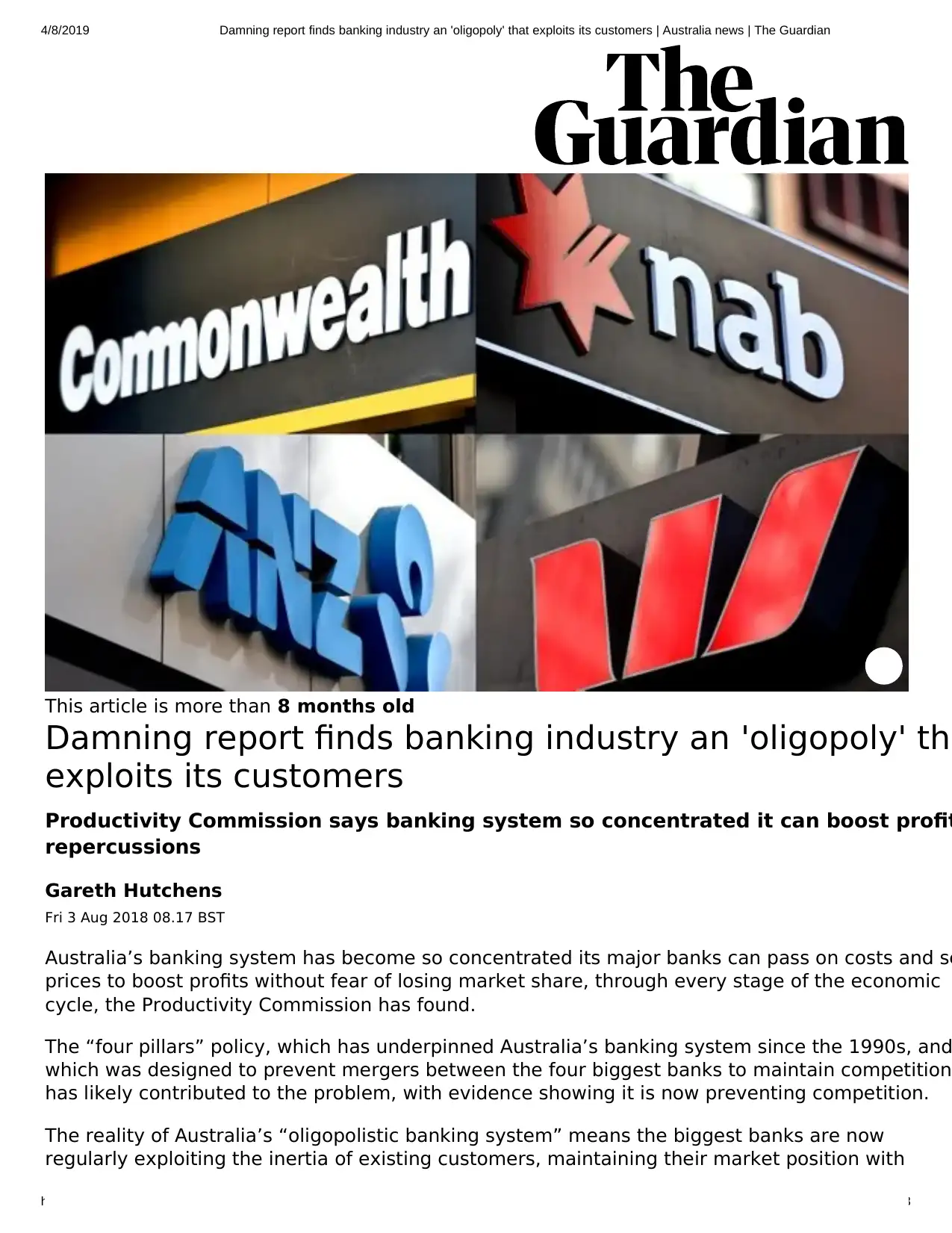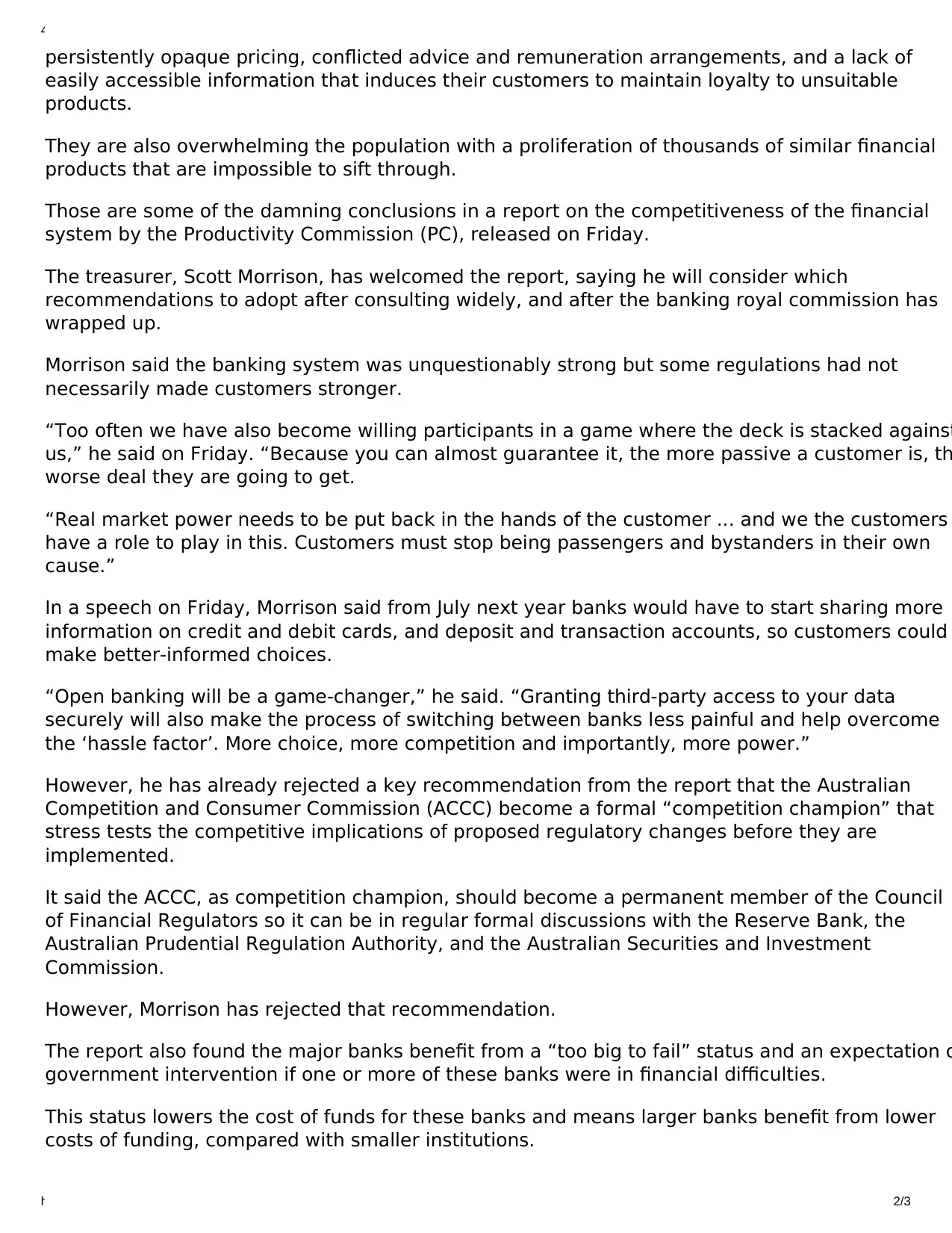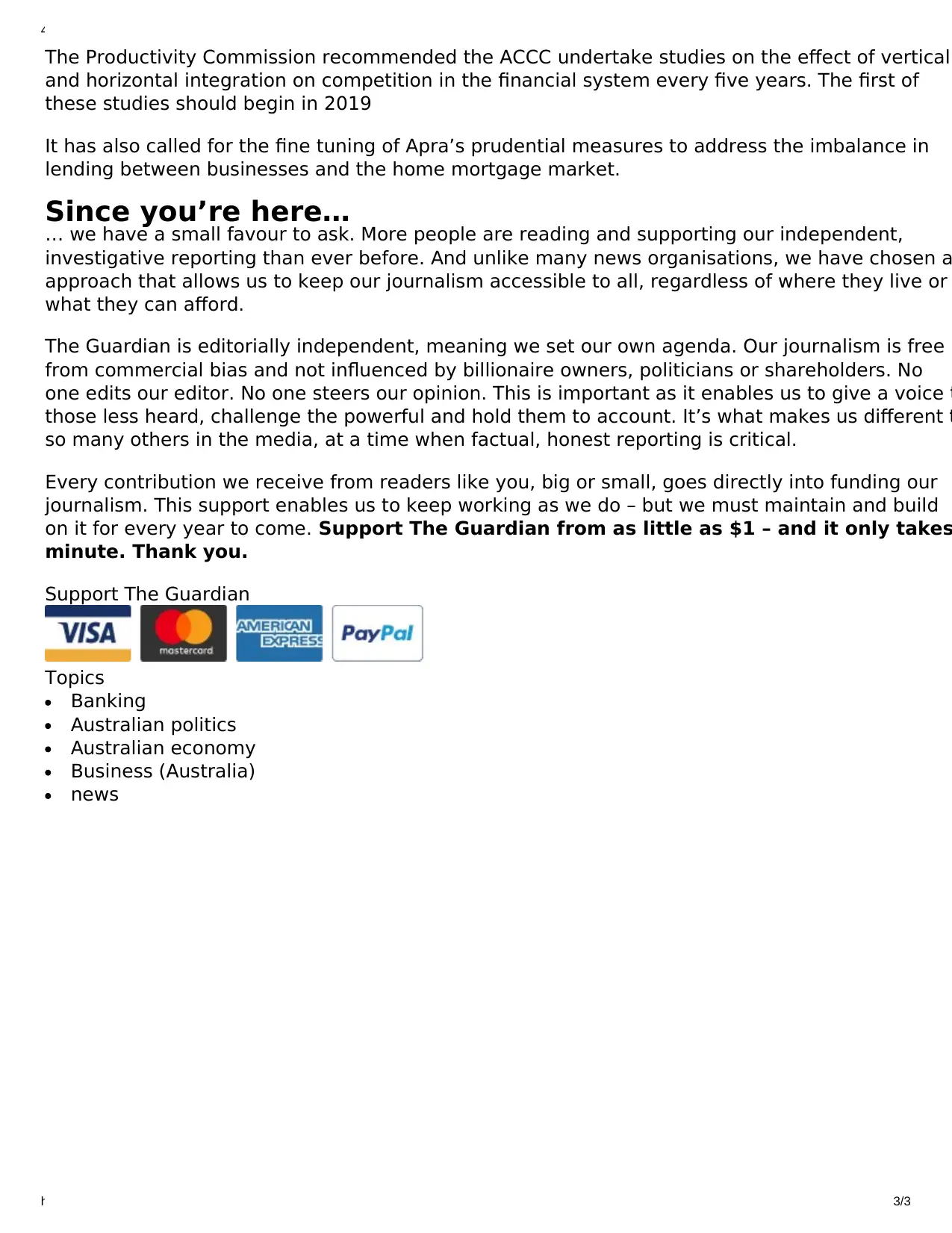Microeconomics Major Project: Economics Critique of Market Structures
VerifiedAdded on 2023/01/18
|3
|1002
|81
Project
AI Summary
This project analyzes an article from The Guardian that reports on a Productivity Commission study finding Australia's banking industry operates as an oligopoly, exploiting customers through opaque pricing and a lack of competition. The report highlights the 'four pillars' policy's contribution to this issue and the banks' 'too big to fail' status, which lowers their funding costs. The article discusses the treasurer's response, including plans for open banking to increase customer choice. The project requires a critique of the article, relating it to microeconomic concepts of market structures, specifically oligopoly, and assessing its implications for consumer welfare and competition within the financial system. The critique must also include analysis of the headline's relevance, the basic theme, and the relevant economic terminology used in the article. The project aims to provide real-world application of microeconomic concepts learned in class.

4/8/2019 Damning report finds banking industry an 'oligopoly' that exploits its customers | Australia news | The Guardian
https://www.theguardian.com/australia-news/2018/aug/03/banking-industry-found-to-be-an-oligopoly-that-exploits-its-customers 1/3
This article is more than 8 months old
Damning report finds banking industry an 'oligopoly' tha
exploits its customers
Gareth Hutchens
Productivity Commission says banking system so concentrated it can boost profit
repercussions
Fri 3 Aug 2018 08.17 BST
Australia’s banking system has become so concentrated its major banks can pass on costs and se
prices to boost profits without fear of losing market share, through every stage of the economic
cycle, the Productivity Commission has found.
The “four pillars” policy, which has underpinned Australia’s banking system since the 1990s, and
which was designed to prevent mergers between the four biggest banks to maintain competition,
has likely contributed to the problem, with evidence showing it is now preventing competition.
The reality of Australia’s “oligopolistic banking system” means the biggest banks are now
regularly exploiting the inertia of existing customers, maintaining their market position with
https://www.theguardian.com/australia-news/2018/aug/03/banking-industry-found-to-be-an-oligopoly-that-exploits-its-customers 1/3
This article is more than 8 months old
Damning report finds banking industry an 'oligopoly' tha
exploits its customers
Gareth Hutchens
Productivity Commission says banking system so concentrated it can boost profit
repercussions
Fri 3 Aug 2018 08.17 BST
Australia’s banking system has become so concentrated its major banks can pass on costs and se
prices to boost profits without fear of losing market share, through every stage of the economic
cycle, the Productivity Commission has found.
The “four pillars” policy, which has underpinned Australia’s banking system since the 1990s, and
which was designed to prevent mergers between the four biggest banks to maintain competition,
has likely contributed to the problem, with evidence showing it is now preventing competition.
The reality of Australia’s “oligopolistic banking system” means the biggest banks are now
regularly exploiting the inertia of existing customers, maintaining their market position with
Paraphrase This Document
Need a fresh take? Get an instant paraphrase of this document with our AI Paraphraser

4/8/2019 Damning report finds banking industry an 'oligopoly' that exploits its customers | Australia news | The Guardian
https://www.theguardian.com/australia-news/2018/aug/03/banking-industry-found-to-be-an-oligopoly-that-exploits-its-customers 2/3
persistently opaque pricing, conflicted advice and remuneration arrangements, and a lack of
easily accessible information that induces their customers to maintain loyalty to unsuitable
products.
They are also overwhelming the population with a proliferation of thousands of similar financial
products that are impossible to sift through.
Those are some of the damning conclusions in a report on the competitiveness of the financial
system by the Productivity Commission (PC), released on Friday.
The treasurer, Scott Morrison, has welcomed the report, saying he will consider which
recommendations to adopt after consulting widely, and after the banking royal commission has
wrapped up.
Morrison said the banking system was unquestionably strong but some regulations had not
necessarily made customers stronger.
“Too often we have also become willing participants in a game where the deck is stacked against
us,” he said on Friday. “Because you can almost guarantee it, the more passive a customer is, th
worse deal they are going to get.
“Real market power needs to be put back in the hands of the customer ... and we the customers
have a role to play in this. Customers must stop being passengers and bystanders in their own
cause.”
In a speech on Friday, Morrison said from July next year banks would have to start sharing more
information on credit and debit cards, and deposit and transaction accounts, so customers could
make better-informed choices.
“Open banking will be a game-changer,” he said. “Granting third-party access to your data
securely will also make the process of switching between banks less painful and help overcome
the ‘hassle factor’. More choice, more competition and importantly, more power.”
However, he has already rejected a key recommendation from the report that the Australian
Competition and Consumer Commission (ACCC) become a formal “competition champion” that
stress tests the competitive implications of proposed regulatory changes before they are
implemented.
It said the ACCC, as competition champion, should become a permanent member of the Council
of Financial Regulators so it can be in regular formal discussions with the Reserve Bank, the
Australian Prudential Regulation Authority, and the Australian Securities and Investment
Commission.
However, Morrison has rejected that recommendation.
The report also found the major banks benefit from a “too big to fail” status and an expectation o
government intervention if one or more of these banks were in financial difficulties.
This status lowers the cost of funds for these banks and means larger banks benefit from lower
costs of funding, compared with smaller institutions.
https://www.theguardian.com/australia-news/2018/aug/03/banking-industry-found-to-be-an-oligopoly-that-exploits-its-customers 2/3
persistently opaque pricing, conflicted advice and remuneration arrangements, and a lack of
easily accessible information that induces their customers to maintain loyalty to unsuitable
products.
They are also overwhelming the population with a proliferation of thousands of similar financial
products that are impossible to sift through.
Those are some of the damning conclusions in a report on the competitiveness of the financial
system by the Productivity Commission (PC), released on Friday.
The treasurer, Scott Morrison, has welcomed the report, saying he will consider which
recommendations to adopt after consulting widely, and after the banking royal commission has
wrapped up.
Morrison said the banking system was unquestionably strong but some regulations had not
necessarily made customers stronger.
“Too often we have also become willing participants in a game where the deck is stacked against
us,” he said on Friday. “Because you can almost guarantee it, the more passive a customer is, th
worse deal they are going to get.
“Real market power needs to be put back in the hands of the customer ... and we the customers
have a role to play in this. Customers must stop being passengers and bystanders in their own
cause.”
In a speech on Friday, Morrison said from July next year banks would have to start sharing more
information on credit and debit cards, and deposit and transaction accounts, so customers could
make better-informed choices.
“Open banking will be a game-changer,” he said. “Granting third-party access to your data
securely will also make the process of switching between banks less painful and help overcome
the ‘hassle factor’. More choice, more competition and importantly, more power.”
However, he has already rejected a key recommendation from the report that the Australian
Competition and Consumer Commission (ACCC) become a formal “competition champion” that
stress tests the competitive implications of proposed regulatory changes before they are
implemented.
It said the ACCC, as competition champion, should become a permanent member of the Council
of Financial Regulators so it can be in regular formal discussions with the Reserve Bank, the
Australian Prudential Regulation Authority, and the Australian Securities and Investment
Commission.
However, Morrison has rejected that recommendation.
The report also found the major banks benefit from a “too big to fail” status and an expectation o
government intervention if one or more of these banks were in financial difficulties.
This status lowers the cost of funds for these banks and means larger banks benefit from lower
costs of funding, compared with smaller institutions.

4/8/2019 Damning report finds banking industry an 'oligopoly' that exploits its customers | Australia news | The Guardian
https://www.theguardian.com/australia-news/2018/aug/03/banking-industry-found-to-be-an-oligopoly-that-exploits-its-customers 3/3
The Productivity Commission recommended the ACCC undertake studies on the effect of vertical
and horizontal integration on competition in the financial system every five years. The first of
these studies should begin in 2019
It has also called for the fine tuning of Apra’s prudential measures to address the imbalance in
lending between businesses and the home mortgage market.
Since you’re here…
… we have a small favour to ask. More people are reading and supporting our independent,
investigative reporting than ever before. And unlike many news organisations, we have chosen a
approach that allows us to keep our journalism accessible to all, regardless of where they live or
what they can afford.
The Guardian is editorially independent, meaning we set our own agenda. Our journalism is free
from commercial bias and not influenced by billionaire owners, politicians or shareholders. No
one edits our editor. No one steers our opinion. This is important as it enables us to give a voice t
those less heard, challenge the powerful and hold them to account. It’s what makes us different t
so many others in the media, at a time when factual, honest reporting is critical.
Every contribution we receive from readers like you, big or small, goes directly into funding our
journalism. This support enables us to keep working as we do – but we must maintain and build
on it for every year to come. Support The Guardian from as little as $1 – and it only takes
minute. Thank you.
Support The Guardian
Topics
Banking
Australian politics
Australian economy
Business (Australia)
news
https://www.theguardian.com/australia-news/2018/aug/03/banking-industry-found-to-be-an-oligopoly-that-exploits-its-customers 3/3
The Productivity Commission recommended the ACCC undertake studies on the effect of vertical
and horizontal integration on competition in the financial system every five years. The first of
these studies should begin in 2019
It has also called for the fine tuning of Apra’s prudential measures to address the imbalance in
lending between businesses and the home mortgage market.
Since you’re here…
… we have a small favour to ask. More people are reading and supporting our independent,
investigative reporting than ever before. And unlike many news organisations, we have chosen a
approach that allows us to keep our journalism accessible to all, regardless of where they live or
what they can afford.
The Guardian is editorially independent, meaning we set our own agenda. Our journalism is free
from commercial bias and not influenced by billionaire owners, politicians or shareholders. No
one edits our editor. No one steers our opinion. This is important as it enables us to give a voice t
those less heard, challenge the powerful and hold them to account. It’s what makes us different t
so many others in the media, at a time when factual, honest reporting is critical.
Every contribution we receive from readers like you, big or small, goes directly into funding our
journalism. This support enables us to keep working as we do – but we must maintain and build
on it for every year to come. Support The Guardian from as little as $1 – and it only takes
minute. Thank you.
Support The Guardian
Topics
Banking
Australian politics
Australian economy
Business (Australia)
news
⊘ This is a preview!⊘
Do you want full access?
Subscribe today to unlock all pages.

Trusted by 1+ million students worldwide
1 out of 3
Related Documents
Your All-in-One AI-Powered Toolkit for Academic Success.
+13062052269
info@desklib.com
Available 24*7 on WhatsApp / Email
![[object Object]](/_next/static/media/star-bottom.7253800d.svg)
Unlock your academic potential
Copyright © 2020–2026 A2Z Services. All Rights Reserved. Developed and managed by ZUCOL.





